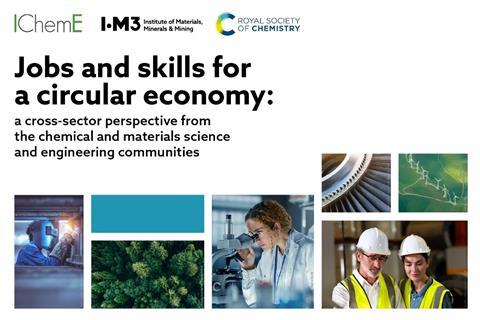The future materials economy must be more circular than today’s. Part of the transition towards a more sustainable treatment of finite resources is technological – developing new processes, remodelling products and supply chains. But it also requires significant transitions in our attitudes towards material resources and their lifecycles, and the skills of the people required – both to effect the transition and to operate within a circular economy.

A new UK-focused report: Jobs and Skills for a circular economy – jointly prepared by the Institution of Chemical Engineers (IChemE), the Institute of Materials, Minerals and Mining (IOM3) and the Royal Society of Chemistry (RSC), highlights significant skills gaps across several professional groups that will be key to transforming our materials economy. The report also sets out a suite of recommendations for how government, industry, educators and professional bodies can work together to build the skilled workforce that meets the needs of a circular economy.
It’s easy to frame this skills gap as someone else’s problem. While there is some constructive dialogue, there remain industry voices that bemoan a lack of ‘appropriately skilled’ graduates and workers, without really articulating what skills they are missing. And when challenged to invest in the requisite training themselves, those same voices frequently assert that they lack the time or resources, calling on universities and government to somehow plug the gaps. In reality there are significant roles for all parties.
Expecting higher and further education providers to produce drop-in employees for every aspect of an evolving industrial environment is clearly unrealistic. There is certainly scope (identified within the report) for educators to better prepare learners (across academic and vocational streams of education) by familiarising them with the ideas and principles of circularity. It is also crucial that people emerge from their education equipped with the foundational skills and knowledge that enable them to rapidly integrate into different sectors. That requires clear communication between industry and educators about what that actually looks like, and active collaboration with an engaged government to align funding and policy that enables more flexible and interdisciplinary approaches, as well as setting clear political priorities that reinforce the strategic importance of these skillsets.
There are also huge potential resources within the existing chemical sciences workforce. Over the past year, declines and downturns in several sectors – including oil and gas production, refining, biofuels and petrochemicals – have led to plant closures and job cuts affecting thousands of people with extensive skills and experience that are eminently transferable to the needs of a circular economy.
There is a huge opportunity to encourage such people to retrain and refocus their skills. But to do that, there need to be clear pathways for people to follow, with sufficient support (and visibility of appropriate employment opportunities) to reassure them that the effort will be worthwhile.

















No comments yet